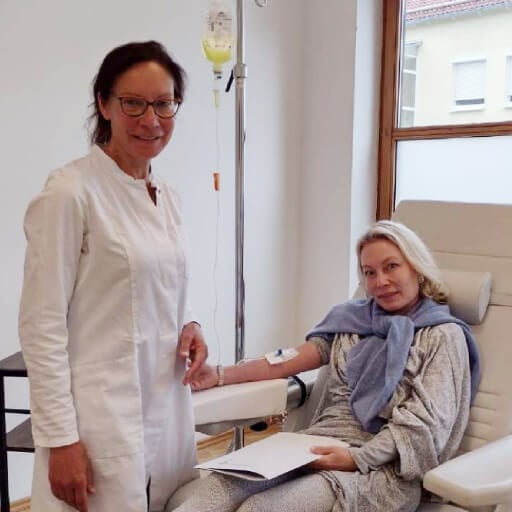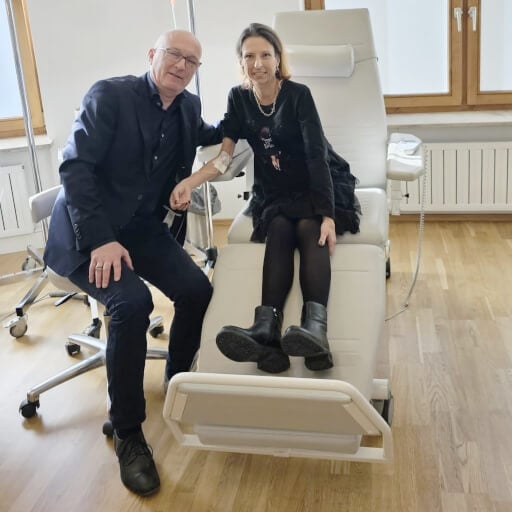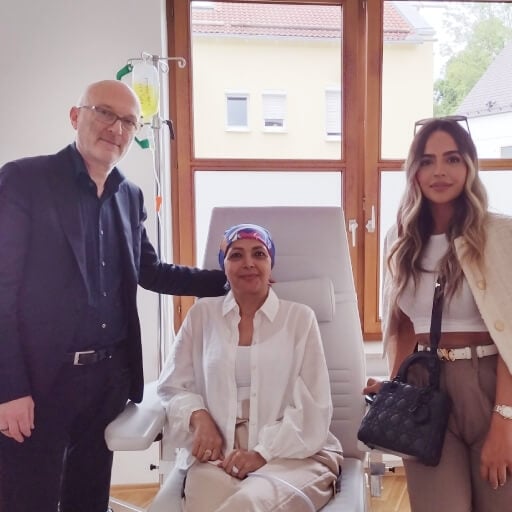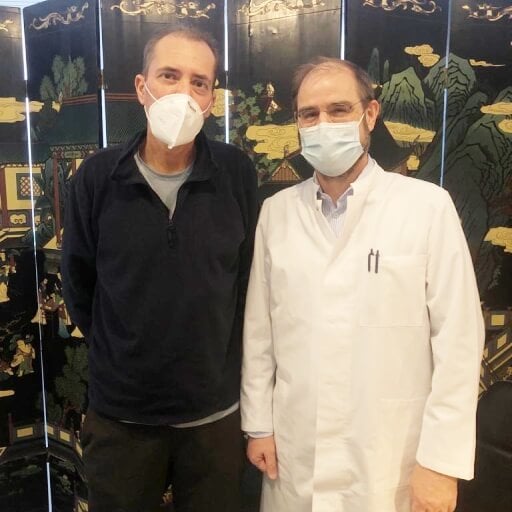Facing colon cancer feels overwhelming, but you have more treatment options than ever before. While treatment for colon cancer stage 1 provides 90% five-year survival rates [1], even advanced cases now benefit from breakthrough therapies that deliver chemotherapy directly to tumor sites, harness your immune system's power, and use precision techniques to destroy cancer cells without major surgery. Modern treatment centers combine multiple innovative approaches tailored to your specific situation, transforming challenging diagnoses into manageable conditions with significantly improved life expectancy and quality of life.
Understanding Colon Cancer: Key Facts About This Disease
Colon cancer ranks as the third most common cancer worldwide, with nearly 2 million new cases annually [2]. In the United States alone, over 107,000 new colon cancer cases are expected in 2025, affecting both men and women almost equally [3].
While these statistics may seem daunting, colon cancer is highly treatable when detected early. Screening remains your most powerful tool against this disease. Regular screening for adults over 50 – or earlier for those with a family history – can identify precancerous polyps before they develop into cancer. When caught early and localized to the bowel, surgery achieves cure rates of approximately 50%.
However, advanced cases require specialized expertise. Modern treatment centers offer advanced bowel cancer treatment combining multiple innovative therapies tailored to individual patient needs, providing hope even when standard treatments fall short. The key lies in accessing the right care at the right time.
Conventional Treatment Approaches for Colon Cancer
Standard colon cancer treatment follows established protocols that have proven effective across different disease stages. The foundation remains surgical removal of the tumor and surrounding lymph nodes, with additional therapies added based on cancer stage and patient condition. [4]
Primary colon cancer treatment by stage:
- Early-stage disease. Bowel cancer treatment at stage 1 typically involves surgery alone. Options include polypectomy during colonoscopy for very small cancers, endoscopic mucosal resection for larger polyps, or minimally invasive laparoscopic surgery. These approaches offer faster recovery and shorter hospital stays compared to traditional open surgery.
- Intermediate stages. Stage 2 colon cancer treatment focuses on partial colectomy to remove the tumor-containing bowel segment plus surrounding healthy tissue. Adjuvant chemotherapy may be considered in select high-risk cases to eliminate microscopic cancer cells that might remain after surgery.
- Advanced local disease. Treatment for stage 3 colon cancer combines surgical resection with adjuvant chemotherapy. This approach to stage 3 colon cancer treatment significantly reduces recurrence risk by targeting cancer cells that may have spread to nearby lymph nodes.
- Metastatic disease. Stage 4 treatment includes surgery when possible, systemic chemo treatment, targeted therapy attacking specific cancer cell markers, and immunotherapy to help the immune system recognize and destroy cancer cells. Radiation therapy may relieve symptoms like pain or bleeding when surgery isn't feasible.
Colon cancer stage 1 treatment often allows complete cure through surgical removal alone, while advanced stages require comprehensive multimodal approaches combining these established therapies for optimal patient outcomes.
Advanced Intraperitoneal Chemotherapy Methods for Colon Cancer
When colon cancer spreads to the abdominal lining (peritoneum), traditional chemotherapy struggles to reach these areas effectively. Advanced intraperitoneal techniques deliver concentrated cancer-fighting drugs directly into the abdominal cavity, achieving medication levels up to 20 times higher than standard IV chemotherapy while minimizing whole-body side effects.
Hyperthermic Intraperitoneal Chemotherapy (HIPEC) for Colon Cancer
HIPEC represents an innovative dual-action treatment for bowel cancer specifically designed for patients with peritoneal metastases – cancer deposits that have spread to the abdominal lining. This specialized procedure combines cytoreductive surgery with heated chemotherapy delivered directly into the abdominal cavity, offering hope when conventional treatments fall short. [5]
While systemic chemotherapy struggles to reach peritoneal surfaces effectively, HIPEC delivers concentrated medication directly to affected areas at temperatures of 40-43°C. This targeted approach provides several key advantages for patients:
- Delivers chemotherapy concentrations up to 15 times higher than traditional methods
- Precisely targets microscopic cancer cells that surgery cannot remove
- Heat enhances drug penetration and therapeutic effectiveness
- Minimizes systemic side effects while maximizing treatment impact
- Offers meaningful survival extension for advanced cases
The HIPEC procedure follows a carefully orchestrated process. First, surgeons perform cytoreductive surgery, meticulously removing all visible tumor tissue from peritoneal surfaces. Following complete tumor removal, specialized drains are positioned throughout the abdominal cavity. The surgical team then circulates heated chemotherapy solution for 30-90 minutes using a precise perfusion system that ensures even distribution throughout the abdomen.
This targeted delivery method allows medication to reach microscopic cancer cells that surgery cannot eliminate. The entire procedure typically requires 5-10 hours, with patients needing 10-14 days of hospital recovery.
For patients seeking a deeper understanding of this breakthrough treatment of bowel cancer, watch our exclusive interview with Dr. Michael Lipp, a leading HIPEC specialist, as he explains how this innovative procedure is transforming outcomes for patients with peritoneal metastasis.
"HIPEC Treatment: A Breakthrough in Advanced Abdominal Cancer Care" - Interview with Dr. Michael Lipp
Pressurized Intraperitoneal Aerosol Chemotherapy (PIPAC) for Colon Cancer
PIPAC offers a revolutionary minimally invasive approach for colon cancer patients with peritoneal metastases who cannot undergo major surgery. This innovative technique transforms liquid chemotherapy into a pressurized aerosol that penetrates tumor tissues more effectively than conventional methods. [6]
Unlike HIPEC's extensive surgical requirements, PIPAC uses laparoscopic technology with just two small abdominal incisions. Chemotherapy is aerosolized and distributed under pressure throughout the abdominal cavity, remaining for 30 minutes before removal. The entire procedure takes only 60-90 minutes.
Key patient benefits include:
- Outpatient or short 2-3 day hospital stays versus 10-14 days with HIPEC
- Repeatable treatment every 6-8 weeks, allowing ongoing pathology management
- Compatible with concurrent systemic chemotherapy for comprehensive care
- Suitable for patients too frail for major surgery
- Minimal physical trauma with faster recovery times
- Potential to downstage disease, making future surgical options possible
PIPAC addresses the critical challenge of drug delivery to peritoneal surfaces where systemic chemotherapy struggles to penetrate effectively. For patients with extensive peritoneal disease who aren't HIPEC candidates, PIPAC provides meaningful colon cancer treatment options with significantly reduced physical burden.
This approach represents hope for maintaining quality of life while actively treating advanced disease, offering patients a bridge therapy that may eventually enable more aggressive interventions as their condition stabilizes.
Transarterial Chemoembolization for Colon Cancer: Targeted Liver Metastases Treatment
TACE represents a sophisticated precision therapy specifically designed for colon cancer patients with liver metastases who cannot undergo surgery or have failed systemic chemotherapy. This minimally invasive approach delivers concentrated medication directly to tumor sites while preserving healthy liver tissue.
During TACE, interventional radiologists insert a thin catheter through a small incision in the groin, threading it precisely through blood vessels to reach arteries feeding liver metastases. This targeted delivery system takes advantage of the liver's unique dual blood supply – while healthy tissue receives most nutrition from the portal vein, tumors depend primarily on hepatic arteries.
Through the catheter, specialists deliver a carefully formulated mixture of chemotherapy agents and embolic materials directly into tumor-feeding vessels. This dual-action approach creates powerful anti-cancer effects:
- Chemotherapy concentrations reach levels up to 20 times higher than systemic delivery
- Embolic materials block the tumor's blood supply, cutting off oxygen and nutrients
- Blocked vessels trap chemotherapy in contact with cancer cells longer, maximizing effectiveness
- Healthy liver tissue remains largely unaffected
Key patient benefits include dramatically reduced systemic side effects, precise tumor targeting, and typically 24-48 hour recovery periods. TACE procedures can be repeated every 4-6 weeks as needed and are often performed on an outpatient basis.
Prof. Kovács: Why Interventional Oncology Should Be the Fourth Pillar of Cancer Care
Immunotherapy with Dendritic Cells for Bowel Cancer
Dendritic cell therapy for colon cancer represents a breakthrough immunotherapy approach, particularly valuable when conventional treatment of colon cancer has failed. This Nobel Prize-winning mechanism harnesses the body's natural immune system to recognize and eliminate cancer cells throughout the body [7].
The therapy works by reprogramming immune cells to target cancer specifically. Through a simple blood collection procedure similar to donation, dendritic cells are harvested and processed in specialized GMP-certified laboratories. These cells are then "educated" to recognize unique proteins from the patient's specific colon cancer, creating a personalized vaccine tailored to each individual's tumor characteristics.
Once reinfused, this type of immunotherapy for bowel cancer activates the immune system's T-cells, creating robust and stable targeted anti-cancer immunity that seeks out and destroys malignant cells wherever they hide in the body.
Key advantages for colon cancer patients include:
- Personalized treatment based on individual tumor genetics
- Minimal side effects – primarily mild flu-like symptoms for 1-2 days
- Whole-body approach effective against metastatic disease
- Compatible with surgery, chemotherapy, and other treatments
- Preserved quality of life during treatment
- Long-lasting immunity that continues working after treatment ends
- Suitable for patients too frail for aggressive conventional therapies
European cancer centers report encouraging results in colon cancer treatment, with patients experiencing disease stabilization, reduced tumor burden, and extended survival. This new treatment for colon cancer stage 4 and earlier stages, helps many patients achieve significant quality of life improvements, better symptom management, and maintain daily function.
"Every Patient Deserves an Individual Approach": Interview with Renowned German Immunologist Prof. Gansauge
Modern Minimally Invasive Colon Cancer Treatments
For patients with liver or lung metastases who cannot undergo major surgery, thermal and freezing technologies offer outpatient alternatives that destroy tumors through controlled heat or extreme cold. These procedures typically require only same-day discharge with minimal recovery time, making them ideal for patients seeking the best colon cancer treatment while maintaining their daily routines.
Thermal Ablation Techniques for Colon Cancer: RFA and Microwave Technology
Thermal ablation offers minimally invasive treatment options for colon cancer patients with liver metastases who cannot undergo surgery. These outpatient procedures use controlled heat to destroy tumor tissue while preserving healthy surrounding organs.
Radiofrequency ablation (RFA) works by inserting a thin needle directly into tumors under imaging guidance, delivering high-frequency electrical current that generates intense heat (60-100°C) to destroy cancer cells. The procedure typically takes 10-15 minutes per tumor and can treat lesions up to 5cm in size.
Microwave ablation (MWA) represents advanced thermal technology, using electromagnetic energy to create friction that heats and destroys cancer tissue more efficiently. This newer approach treats tumors faster (5-13 minutes) and works effectively even near blood vessels where RFA may be limited.
Key patient benefits include:
- Outpatient procedures with same-day discharge are possible
- Minimal recovery time compared to major surgery
- Lower complication rates than surgical resection
- Suitable for patients with compromised liver function
- Can be repeated if new metastases develop
- Effective for both liver and lung metastasis from colon cancer
Both techniques show comparable effectiveness, with RFA offering slightly lower complication rates while MWA provides faster treatment times and better results near major blood vessels. They represent valuable options for maintaining quality of life while achieving meaningful disease control in advanced colon cancer cases.
A prospective multicentre trial on survival after Microwave Ablation VErsus Resection for Resectable Colorectal liver metastases (MAVERRIC)
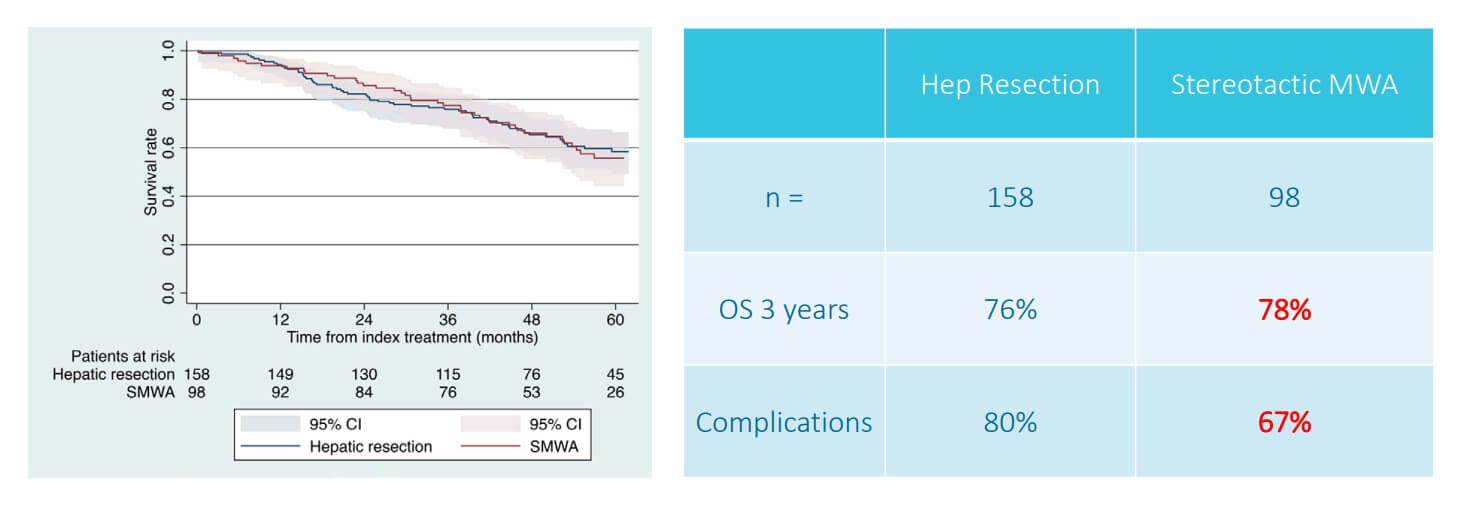
Cryotherapy for Colon Cancer: Eliminating Tumors Through Controlled Freezing
Cryoablation harnesses extreme cold to destroy colon cancer tumors with exceptional precision, using liquid nitrogen to create temperatures below -75°C that rupture cancer cell membranes and trigger natural cell death.
During the procedure, specialized probes are inserted into tumors under imaging guidance, creating an "ice ball" that engulfs the cancer. The area is typically frozen, thawed, and refrozen to ensure complete destruction. This technique treats both liver and lung metastases effectively.
Key advantages for colon cancer patients include:
- Exceptional visibility of treatment boundaries during the procedure
- Precise control between treated and healthy tissue
- Effective near blood vessels and critical structures
- Treatment of tumors up to 4cm in diameter
- Can be performed through open surgery, laparoscopy, or percutaneously
The procedure is primarily reserved for patients with multiple tumors in both liver lobes, lesions in locations unsuitable for surgery, or patients who are too high-risk for major operations. Recovery typically involves 3-4 days of hospitalization, with most patients experiencing minimal post-procedural pain.
Cryoablation represents a valuable option for maintaining quality of life while achieving meaningful tumor control, particularly beneficial for patients who cannot undergo conventional surgery due to medical conditions or tumor location.
| Characteristic | Standard Treatment | Innovative Methods |
|---|---|---|
| 2-Year Survival Rate | ~25% for advanced cancer | ~60% for advanced cancer |
| Response Rate | Under 10% response rate | 45-65% positive response |
| Treatment Duration | Several cycles over months | Up to 4 sessions |
| Adverse Effects | Significant and widespread (severe nausea, profound weakness, complete alopecia, compromised immunity, dermatitis) | Mostly mild effects (mainly limited to temporary discomfort at the treatment site) |
| Cost in Germany | €80,000 - €150,000 full course | €25,000 - €60,000 full course |
| Cost in Great Britain | €90,000 - €165,000 full course | €70,000 - €120,000 full course |
| Cost in the USA | €100,000 - €180,000 full course | €100,000 - €150,000 full course |
Data from Booking Health analysis. Final costs depend on case complexity, hospital stay duration, required follow-up care, and additional expenses such as diagnostic procedures, travel arrangements, and lodging expenses.
Colon Cancer Patient Journey: A Real-Life Treatment Story
When Sarasibala Premachandran from Britain received her stage 4 colon cancer diagnosis, her daughter Sughandi recalls the overwhelming fear that followed. Determined to explore every possibility, the family sought specialized care at the University Hospital Frankfurt am Main in Germany.
"We were nervous about traveling abroad for new colon cancer treatment, especially with mum being so unwell," Sughandi explains. "But from the moment we arrived, we felt supported and informed."
Under Prof. Vogl's care, Sarasibala underwent TACE (transarterial chemoembolization), a precision therapy that delivers concentrated chemotherapy while blocking the tumor's blood supply. The three-week treatment program included dedicated coordination support, helping bridge communication between the family and medical team throughout the process.
"Dr. Vogl has been amazing – knowledgeable, understanding, and trustworthy," Sughandi notes. "We're nearly at the end of our journey here and feeling very hopeful about the results."
Sarasibala's experience demonstrates how specialized centers can offer new treatment for colon cancer, like TACE, for patients with metastatic colon cancer, providing new hope when conventional options seem limited.
Modern Cancer Treatment: Patient Journeys with Booking Health
Renewed Hope: How Modern Therapies Transform Colon Cancer Patient Outcomes
A stage 4 colon cancer diagnosis can feel overwhelming, especially when local doctors suggest limited options. Yet advanced cases don't mean the end of possibilities – they mean it's time to explore innovative approaches tailored specifically to your situation.
Modern cancer centers now combine multiple cutting-edge treatments based on individual patient needs. Stage 4 colon cancer treatment today involves TACE for liver metastases, dendritic cell immunotherapy to boost your immune response, and minimally invasive ablation techniques – these aren't one-size-fits-all solutions but personalized combinations designed around your specific cancer profile.
Unlike traditional chemotherapy that requires weeks in the hospital with severe side effects, many innovative 4 stage colorectal cancer treatment options involve just short outpatient visits. Patients often experience minimal disruption to daily life while achieving meaningful results – tumor shrinkage, halted progression, improved quality of life.
Whether dealing with advanced colon cancer or 4 stage rectal cancer, the key lies in accessing hospitals that offer comprehensive evaluations and multiple treatment options under one roof. When standard protocols fall short, specialized international facilities provide hope through innovation, combining the most effective therapies for your unique case.
Your diagnosis doesn't define your future – the right combination of modern treatments, guided by experienced specialists, can transform even the most challenging prognosis into manageable conditions with renewed hope for a meaningful time ahead.
Your Trusted Partner: Every Step of the Way With Booking Health
Finding the best treatment strategy for your clinical situation is a challenging task. Being already exhausted from multiple treatment sessions, having consulted numerous specialists, and having tried various therapeutic interventions, you may be lost in all the information given by the doctors. In such a situation, it is easy to choose a first-hand option or to follow standardized therapeutic protocols with a long list of adverse effects instead of selecting highly specialized innovative treatment options.
To make an informed choice and get a personalized cancer management plan, which will be tailored to your specific clinical situation, consult medical experts at Booking Health. Being at the forefront of offering the latest medical innovations for 12 years, Booking Health possesses solid expertise in creating complex cancer management programs in each case. As a reputable company, Booking Health offers personalized stage 4 colon cancer treatment plans with direct clinic booking and full support at every stage, from organizational processes to assistance during treatment. We provide:
- Assessment and analysis of medical reports
- Development of the medical care program
- Selection of a suitable treatment location
- Preparation of medical documents and forwarding to a suitable clinic
- Preparatory consultations with clinicians for the development of medical care programs
- Expert advice during the hospital stay
- Follow-up care after the patient returns to their native country after completing the medical care program
- Taking care of formalities as part of the preparation for the medical care program
- Coordination and organization of the patient's stay in a foreign country
- Assistance with visas and tickets
- A personal coordinator and interpreter with 24/7 support
- Transparent budgeting with no hidden costs
Health is an invaluable aspect of our lives. Delegating management of something so fragile yet precious should be done only to experts with proven experience and a reputation. Booking Health is a trustworthy partner who assists you in pursuing stronger health and a better quality of life. Contact our medical consultant to learn more about the possibilities of personalized treatment with innovative methods for metastatic bowel cancer with leading specialists in this field.
FAQ About Colon Cancer Answered
Send request for treatmentColon cancer develops when cells in the large intestine grow uncontrollably. It typically begins as small polyps that can become malignant over time. Most cases start in the inner lining and progress through tissue layers if left untreated.
Yes, colon cancer is highly curable when detected early. Stage 1 disease has cure rates exceeding 90%, while even advanced cases benefit from modern treatments that significantly extend survival and improve quality of life.
Age over 50, family history, inflammatory bowel disease, and lifestyle factors like smoking and high-fat diets increase risk. However, many patients develop colon cancer without clear risk factors, making regular screening essential.
Early colon cancer often causes no symptoms. Warning signs include blood in stool, persistent abdominal pain, unexplained weight loss, changes in bowel habits, and fatigue from anemia.
About 5-10% of colon cancers result from inherited genetic mutations. Family history increases risk, but most cases occur sporadically in people without genetic predisposition or family cancer history.
Common symptoms and treatment discussions include rectal bleeding, cramping, persistent fatigue, narrow stools, and feeling that the bowel doesn't empty completely during bowel movements.
Stool tests can detect blood or DNA markers. However, colonoscopy remains the gold standard for detecting and removing precancerous polyps before they become malignant.
Diagnosis combines colonoscopy with tissue biopsy, followed by staging scans like CT or MRI. Blood tests measure tumor biomarkers to assess disease extent and guide treatment planning.
Colon cancer ranks third globally among all cancers, with nearly 2 million new cases annually. In the United States, over 107,000 new cases are expected in 2025, affecting men and women almost equally.
Most colon cancers grow slowly over several years, typically taking 5-10 years to develop from polyps. However, some aggressive forms can progress more rapidly, emphasizing the importance of regular screening.
Early polyps can be removed during a colonoscopy, without treatment like major surgery. Advanced cases may use natural treatment approaches like immunotherapy alongside conventional methods, but surgery remains the primary treatment.
Five-year survival rates exceed 90% for localized disease, 70% for regional spread, and 15% for distant metastases. Modern treatments significantly improve these outcomes through personalized approaches.
Clinical guidelines recommend surgery as primary treatment, with chemotherapy for intermediate and advanced stages. Oncology centers increasingly use precision medicine based on individual tumor characteristics and patient factors.
Stage 1 typically requires surgery alone. Stages 2-3 combine surgery with chemotherapy regimen protocols. Stage 4 uses comprehensive approaches, including targeted therapies and immunotherapy based on tumor genetics.
Stage 1 treatment involves surgical removal of the tumor and surrounding tissue. Most patients require no additional therapy, with excellent long-term cure rates through minimally invasive surgical techniques.
Stage 3 treatment combines surgical resection with adjuvant chemotherapy to eliminate microscopic cancer cells. Neoadjuvant therapy may shrink tumors before surgery in select cases for optimal outcomes.
No, early-stage colon cancer often needs only surgery. Chemotherapy recommendations depend on stage, patient health, and tumor characteristics. Monoclonal antibody therapies provide targeted alternatives for specific cases.
Adjuvant therapy uses chemotherapy after surgery to eliminate remaining microscopic cancer cells. It significantly reduces recurrence risk in intermediate and advanced stages, improving long-term survival outcomes.
Recent advances include dendritic cell vaccination, HER2-positive targeted therapies, precision medicine based on genetic testing, and minimally invasive techniques like thermal ablation that promise improved outcomes with fewer side effects.
While surgery remains the cornerstone, some patients benefit from ablation techniques, chemoembolization, or immunotherapy approaches. These methods are particularly valuable for patients unsuitable for major surgical procedures.
Recovery typically takes 4-6 weeks for open surgery and 2-4 weeks for minimally invasive approaches. Most patients return to normal activities within 6-8 weeks, with full healing occurring over several months.
Post-treatment care includes regular follow-up visits, blood tests for tumor markers, imaging scans, and colonoscopy surveillance. Lifestyle modifications like a healthy diet and exercise support long-term recovery and reduce recurrence risk.
The two-year survival rate for colon cancer is around 25% with standard therapy. However, it can reach up to 60% with innovative treatments (e.g., HIPEC, TACE, or dendritic cell immunotherapy).
How do survival outcomes differ between standard and advanced treatment approaches for colon cancer?
Colon cancer patients can achieve longer survival with advanced therapies in comparison to those who are treated with conventional chemotherapy alone.
Standard chemotherapy for colon cancer shows response rates below 10%. On the other hand, modern therapies (e.g., dendritic cell therapy) can achieve ~45-65% response.
Conventional chemotherapy for colon cancer can take several months across multiple cycles. In turn, innovative treatments (e.g., TACE, thermal ablation, etc.) require only a few short sessions.
Traditional colon cancer treatments (e.g., chemotherapy, radiation, etc.) may cause fatigue, nausea, and hair loss. In comparison, innovative options (e.g., dendritic cell therapy, TACE, ablation, etc.) can lead to mild, temporary discomfort.
Choose treatment abroad and you will for sure get the best results!
Authors:
This article was edited by medical experts, board-certified doctors Dr. Nadezhda Ivanisova, and Dr. Bohdan Mykhalniuk. For the treatment of the conditions referred to in the article, you must consult a doctor; the information in the article is not intended for self-medication!
Our editorial policy, which details our commitment to accuracy and transparency, is available here. Click this link to review our policies.
Sources:
[1] Colon Cancer Coalition. Colon Cancer Facts. https://coloncancercoalition.org/colon-cancer-screening/facts/
[2] WHO. Colorectal cancer. https://www.who.int/news-room/fact-sheets/detail/colorectal-cancer
[3] American Cancer Society. Key Statistics for Colorectal Cancer. https://www.cancer.org/cancer/types/colon-rectal-cancer/about/key-statistics.html
[4] NIH, National Cancer Institute. Colon Cancer Treatment (PDQ®)–Patient Version. https://www.cancer.gov/types/colorectal/patient/colon-treatment-pdq
[5] PubMed Central. Hyperthermic intraperitoneal chemotherapy and colorectal cancer: From physiology to surgery. https://pmc.ncbi.nlm.nih.gov/articles/PMC9631165/
[6] PubMed Central. Pressurized IntraPeritoneal Aerosol Chemotherapy (PIPAC)-directed treatment of peritoneal metastasis in end-stage colo-rectal cancer patients. https://pmc.ncbi.nlm.nih.gov/articles/PMC7292236/
[7] PubMed. The 2011 Nobel Prize in physiology or medicine. https://pubmed.ncbi.nlm.nih.gov/22053831/
Read:
Treatment of stage 4 colon cancer in Germany
Article menu:
- Understanding Colon Cancer: Key Facts About This Disease
- Conventional Treatment Approaches for Colon Cancer
- Advanced Intraperitoneal Chemotherapy Methods for Colon Cancer
- Transarterial Chemoembolization for Colon Cancer: Targeted Liver Metastases Treatment
- Immunotherapy with Dendritic Cells for Bowel Cancer
- Modern Minimally Invasive Colon Cancer Treatments
- Colon Cancer Patient Journey: A Real-Life Treatment Story
- Renewed Hope: How Modern Therapies Transform Colon Cancer Patient Outcomes
- Your Trusted Partner: Every Step of the Way With Booking Health
- FAQ About Colon Cancer Answered
Don't know where to start?
Contact Booking Health

